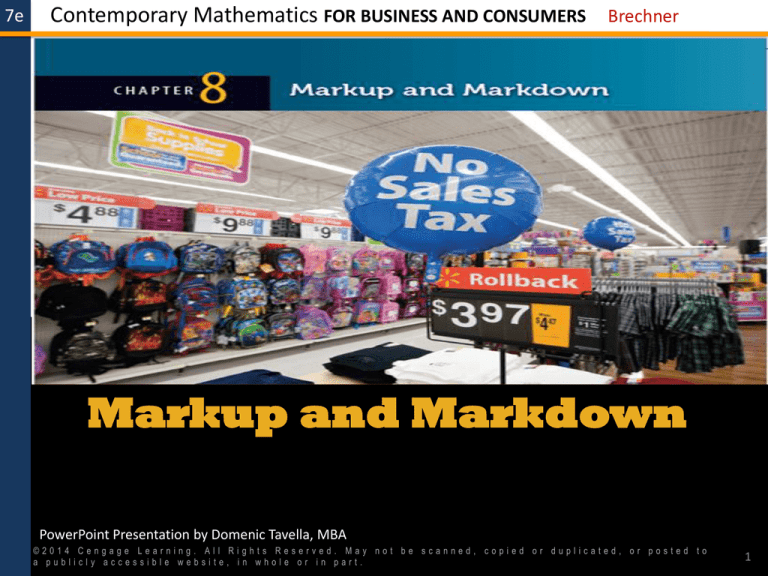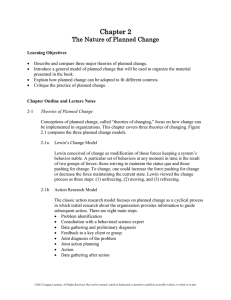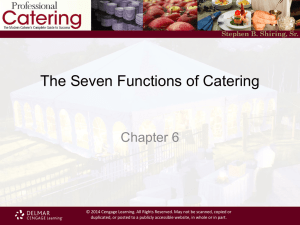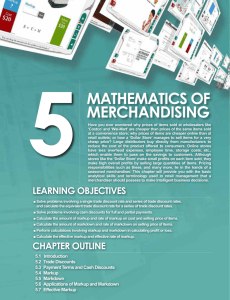
7e
Contemporary Mathematics FOR BUSINESS AND CONSUMERS Brechner
Markup and Markdown
PowerPoint Presentation by Domenic Tavella, MBA
©2014 Cengage Learning. All Rights Reserved. May not be scanned, copied or duplicated, or posted to
a publicly accessible website, in whole or in part.
1
7e
PERFORMANCE OBJECTIVES
Section I Markup Based on Cost
8-1:
Understanding and using the retailing equation
to find cost, amount of markup, and selling
price of an item
8-2:
Calculating percent markup based on cost
8-3:
Calculating selling price when cost and percent
markup based on cost are known
8-4:
Calculating cost when selling price and percent
markup based on cost are known
Section II Markup Based on Selling Price
8-5: Calculating percent markup based on selling
price
8-6: Calculating selling price when cost and percent
markup based on selling price are known
©2014 Cengage Learning. All Rights Reserved. May not be scanned, copied or duplicated, or posted to
a publicly accessible website, in whole or in part.
2
7e
PERFORMANCE OBJECTIVES continued
Section II Markup Based on Selling Price
8-7:
Calculating cost when selling price and percent
markup based on selling price are known
8-8:
Converting percent markup based on cost to percent
markup based on selling price, and vice versa
Section III Markdowns, Multiple Operations, and Perishable
Goods
8-9:
Determining the amount of markdown and the
markdown percent
8-10:
Determining the sale price after a markdown and the
original price before a markdown
8-11:
Computing the final selling price after a series of
markups and markdowns
8-12:
Calculating the selling price of perishable goods
©2014 Cengage Learning. All Rights Reserved. May not be scanned, copied or duplicated, or posted to
a publicly accessible website, in whole or in part.
3
7e
Markup Based on Cost
cost of goods sold
• The cost of the merchandise sold during an operating
period.
• One of two major expense categories of a business.
operating expenses, or overhead
• All business expenses, other than cost of merchandise,
required to operate a business.
markup, markon, margin
• The amount added to the cost of an item to cover the
operating expenses and profit.
• The difference between the cost and the selling price.
©2014 Cengage Learning. All Rights Reserved. May not be scanned, copied or duplicated, or posted to
a publicly accessible website, in whole or in part.
4
7e
Cost, Amount of Markup, and
Selling Price of an Item
retailing equation
• The selling price of an item is equal to the cost
plus the markup.
• Selling price = Cost + Markup, SP = C + M
• Markup = Selling price – Cost, M = SP – C
• Cost = Selling price – Markup, C = SP – M
©2014 Cengage Learning. All Rights Reserved. May not be scanned, copied or duplicated, or posted to
a publicly accessible website, in whole or in part.
5
7e
The Retailing Equation
Finding the Selling Price:
• Lawn gnomes cost $6.80 per unit to produce. If a
markup of $9.40 per unit is added to the cost,
what is the selling price?
SP = C + M = 6.80 + 9.40 = $16.20
Finding the Markup:
• A box of golf balls sells for $28.50. If the distributor
was paid $16.75 per box, what is the amount of the
markup?
M = SP – C = 28.50 – 16.75 = $11.75
©2014 Cengage Learning. All Rights Reserved. May not be scanned, copied or duplicated, or posted to
a publicly accessible website, in whole or in part.
6
7e
The Retailing Equation
continued
Finding the Cost:
• After a wholesaler adds a markup of $45 to a Bluray player, it is sold to a retail store for $180.
What is the wholesaler’s cost?
C = SP – M = 180 – 45 = $135
©2014 Cengage Learning. All Rights Reserved. May not be scanned, copied or duplicated, or posted to
a publicly accessible website, in whole or in part.
7
7e
Markup Based on Cost
markup based on cost
• Manufacturers and wholesalers use cost as a
base when cost figures are readily available to
them.
• Percent markup based on cost = Markup = %Mcost= M
Cost
C
©2014 Cengage Learning. All Rights Reserved. May not be scanned, copied or duplicated, or posted to
a publicly accessible website, in whole or in part.
8
7e
Selling Price Based on Cost
Example
A firm purchases monitors for $275.59. The selling price is
$449.99. What is the markup? What is the markup based
on cost?
M = SP – C = 449.99 – 275.59 = $174.40
% M COST
M
C
174.40
.6328 63.3%
275.59
©2014 Cengage Learning. All Rights Reserved. May not be scanned, copied or duplicated, or posted to
a publicly accessible website, in whole or in part.
9
7e
Selling Price Based on Markup
Example
A firm purchases pumps from a distributor for
$35.40 each. If the firm adds a 120% markup
based on cost, at what retail price should each
pump be sold?
SP C(100% % M COST )
SP 35.40(100% 120%)
SP 35.40 (2.2)
SP $77.88
©2014 Cengage Learning. All Rights Reserved. May not be scanned, copied or duplicated, or posted to
a publicly accessible website, in whole or in part.
10
7e
Calculating Cost When Selling Price
and Percent Markup Based on Cost
Are Known
Calculating Cost Based on Cost:
Cost
Selling price
100% Percent markup on cost
SP
C
100% % M COST
©2014 Cengage Learning. All Rights Reserved. May not be scanned, copied or duplicated, or posted to
a publicly accessible website, in whole or in part.
11
7e
Calculating Cost When Selling Price
and Percent Markup Based on Cost
Are Known Example
What is the cost of a printer that sells at retail for $1,750
with a 70% markup based on cost?
SP
C
100% % M COST
1,750
1,750
C
$1,029.41
100% 70%
1.7
©2014 Cengage Learning. All Rights Reserved. May not be scanned, copied or duplicated, or posted to
a publicly accessible website, in whole or in part.
12
7e
Calculating Percent Markup
Based On Selling Price
markup based on selling price
• When selling price is 100%, and the markup is
expressed as a percent of that selling price.
Percent markup based on cost
% M SP
Markup
Selling Price
M
SP
©2014 Cengage Learning. All Rights Reserved. May not be scanned, copied or duplicated, or posted to
a publicly accessible website, in whole or in part.
13
7e
Calculating Percent Markup
Based On Selling Price Example
If a computer has a cost of $544 and is selling
for $999.99, what is the percent markup based
on selling price?
M = SP – C =
999.99 – 544.00 = $455.99
Markup
Percent markup based on cost
Selling Price
% M SP
M
SP
455.99
.4559
999.99
45.6%
©2014 Cengage Learning. All Rights Reserved. May not be scanned, copied or duplicated, or posted to
a publicly accessible website, in whole or in part.
14
7e
Calculating Selling Price When Cost
and Percent Markup Based on
Selling Price Are Known
Calculating Selling Price Based on Selling Price:
Selling price
Cost
100% - Percent markup on selling price
C
SP
100% % M SP
©2014 Cengage Learning. All Rights Reserved. May not be scanned, copied or duplicated, or posted to
a publicly accessible website, in whole or in part.
15
7e
Calculating Selling Price When Cost
and Percent Markup Based on
Selling Price Are Known Example
A store purchases beds for $212.35. If the store policy
is to mark up all merchandise 42% based on selling
price, what is the retail selling price of the beds?
C
SP
100% % M SP
212.35
212.35
SP
$366.12
100% 42%
.58
©2014 Cengage Learning. All Rights Reserved. May not be scanned, copied or duplicated, or posted to
a publicly accessible website, in whole or in part.
16
7e
Calculating Cost When Selling Price
and Percent Markup Based on
Selling Price Are Known
Calculating Cost Based on Selling Price:
Cost Selling Price(100% Percent markup on selling price)
C SP(100% %M SP )
©2014 Cengage Learning. All Rights Reserved. May not be scanned, copied or duplicated, or posted to
a publicly accessible website, in whole or in part.
17
7e
Calculating Cost When Selling Price
and Percent Markup Based on
Selling Price Are Known Example
A buyer is looking for a line of shoes to retail for
$79.95. If the objective is a 55% markup based on
selling price, what is the most the buyer can pay
for the shoes to still get the desired markup?
C SP(100% %M SP )
C 79.95(100% 55%) 79.95(.45) $35.98
©2014 Cengage Learning. All Rights Reserved. May not be scanned, copied or duplicated, or posted to
a publicly accessible website, in whole or in part.
18
7e
Converting Percent Markups
Converting percent markups from cost to
selling price and vice versa:
• Convert a based on cost percent to a based on
selling price percent:
Percent markup based
=
on selling price
Percent markup based on cost
100% + percent markup based on cost
• Convert a based on selling price percent to a based
on cost percent:
Percent markup
based on cost
=
Percent markup based selling price
100% - percent markup based on selling price
©2014 Cengage Learning. All Rights Reserved. May not be scanned, copied or duplicated, or posted to
a publicly accessible website, in whole or in part.
19
7e
Converting Between Markup
Types: Selling Price Example
If the markup on a machine is 43% based on
selling price, what is the corresponding
percent markup based on cost?
% M COST
% M COST
% M SP
100% % M SP
43%
.43
.7543 75.4%
100% 43% .57
©2014 Cengage Learning. All Rights Reserved. May not be scanned, copied or duplicated, or posted to
a publicly accessible website, in whole or in part.
20
7e
Converting Between Markup
Types: Cost Example
If the markup on an oven is 200% based on
cost, what is the corresponding percent
markup based on selling price?
% M SP
% M SP
% M Cost
100% % M Cost
200%
2 .6666 66.7%
100% 200% 3
©2014 Cengage Learning. All Rights Reserved. May not be scanned, copied or duplicated, or posted to
a publicly accessible website, in whole or in part.
21
7e
Markdowns, Multiple Operations,
and Perishable Goods
markdown
• A price reduction from the original selling price
of merchandise.
markdown cancellation
• Raising prices back to the original selling price
after a sale is over.
sale price
• The promotional price of merchandise,
after a markdown.
©2014 Cengage Learning. All Rights Reserved. May not be scanned, copied or duplicated, or posted to
a publicly accessible website, in whole or in part.
22
7e
Determining the Amount of
Markdown
To find the amount of the markdown, take the
original selling price and subtract the sale
price from it.
Amount of
markdown
=
Original selling price – Sale price
©2014 Cengage Learning. All Rights Reserved. May not be scanned, copied or duplicated, or posted to
a publicly accessible website, in whole or in part.
23
7e
Determining the Amount of
Markdown Example
A coffee maker that originally sold for $59.99
was marked down to $47.90. What is the
amount of markdown?
Amount of markdown
Amount of markdown
= Original selling price – Sale price
= 59.99 – 47.90 = 12.09
©2014 Cengage Learning. All Rights Reserved. May not be scanned, copied or duplicated, or posted to
a publicly accessible website, in whole or in part.
24
7e
Determining the Markdown
Percent
To find the markdown percent, use the
percentage formula, Rate = Portion ÷ Base,
where the markdown is the portion, and the
original selling price is the base.
Markdown percent
=
Amount of markdown
Original selling price
©2014 Cengage Learning. All Rights Reserved. May not be scanned, copied or duplicated, or posted to
a publicly accessible website, in whole or in part.
25
7e
Determining the Markdown
Percent Example
What is the markdown percent on a pack of pens
selling for $2.99 that originally sold for $3.69?
Amount of
markdown
= Original selling price – Sale price
Amount of
markdown
= 3.69 – 2.99 = $.70
Markdown percent
=
Amount of markdown
Original selling price
.70
Markdown percent
.1897 19%
3.69
©2014 Cengage Learning. All Rights Reserved. May not be scanned, copied or duplicated, or posted to
a publicly accessible website, in whole or in part.
26
7e
Determining the Sale Price After a
Markdown
To find the sale price after a markdown, use the
formula Portion = Rate x Base, where the sale
price is the portion, the original price is the base
and (100% – markdown percent) is the rate.
Sale
Price
= Original selling price (100% – Markdown Percent)
©2014 Cengage Learning. All Rights Reserved. May not be scanned, copied or duplicated, or posted to
a publicly accessible website, in whole or in part.
27
7e
Determining the Sale Price After a
Markdown Example
Megastore originally sold packs of t-shirts for
$15 each. If the packs were marked down by
25%, what is the sale price of the shirts?
Sale Price = Original selling price (100% – Markdown Percent)
Sale price 15(100% 25%) 15(.75) $11.25
©2014 Cengage Learning. All Rights Reserved. May not be scanned, copied or duplicated, or posted to
a publicly accessible website, in whole or in part.
28
7e
Determining the Original Price
Before a Markdown
To find the original selling price before a
markdown, we use the sale price formula
solved for the original selling price:
Original selling price
=
Sale price
100% – Markdown percent
©2014 Cengage Learning. All Rights Reserved. May not be scanned, copied or duplicated, or posted to
a publicly accessible website, in whole or in part.
29
7e
Determining the Original Price
Before a Markdown Example
What was the original selling price of a laptop
case, currently on sale for $48 after a 35%
markdown? Round answer to the nearest
cent.
Original selling price
=
Sale price
100% – Markdown percent
Original Selling Price
48.00
48.00
$73.85
100% 35%
.65
©2014 Cengage Learning. All Rights Reserved. May not be scanned, copied or duplicated, or posted to
a publicly accessible website, in whole or in part.
30
7e
Computing the Final Selling Price
After a Series of Markups and
Markdowns
staple goods
• Products, considered basic and routinely purchased,
that do not undergo seasonal fluctuations in sales.
seasonal goods
• Products that exhibit seasonal fluctuations in sales
and may undergo many markups and markdowns
during their selling season.
• When solving a series of markups and markdowns
on seasonal goods, remember that each markdown/
markup should be based on the previous selling
price.
©2014 Cengage Learning. All Rights Reserved. May not be scanned, copied or duplicated, or posted to
a publicly accessible website, in whole or in part.
31
7e
Computing a Series of Markups
and Markdowns Example
• In September, a tire shop purchased snow tires for
$48.50 each. The original markup was 55% based on
the selling price.
• In November, the tires were marked down 30%.
• In December, the tires were marked up 20%.
• In February, the tires were marked down 30% again
and in March were cleared out with a final 25%
markdown.
• What was the final selling price of the tires? Round
your answer to the nearest cent.
©2014 Cengage Learning. All Rights Reserved. May not be scanned, copied or duplicated, or posted to
a publicly accessible website, in whole or in part.
32
7e
Computing a Series of Markups
and Markdowns Example continued
SPOriginal
C
100% - % M SP
48.50
48.50
.45
100% - 55%
$107.78
MD November 107.78(100% 30%) 107.78(.7) $75.45
MU December 75.45(100% 20%) 75.45(1.2) $90.54
MD February 90.54(100% 30%) 90.54(.7) $63.38
MD March 63.38(100% .25) 63.38(.75) $47.54
©2014 Cengage Learning. All Rights Reserved. May not be scanned, copied or duplicated, or posted to
a publicly accessible website, in whole or in part.
33
7e
Calculating the Selling Price of
Perishable Goods
perishable goods
• Products that have a certain shelf life and then no
value at all, such as fruits, vegetables, flowers, and
dairy products.
Selling price of
perishable goods
=
Total expected selling price
Total quantity – Anticipated spoilage
©2014 Cengage Learning. All Rights Reserved. May not be scanned, copied or duplicated, or posted to
a publicly accessible website, in whole or in part.
34
7e
Calculating the Selling Price of
Perishable Goods Example
A flower shop purchases 800 dozen roses at a cost of
$6.50 per dozen. If a 10% spoilage rate is anticipated,
at what selling price per dozen must the roses be sold
to achieve a 60% markup based on selling price?
Round answer to the nearest cent.
Selling price of
perishables
=
Total expected selling price
Total quantity – Anticipated spoilage
Cost 800 6.50 $5,200
SP
Cost
5,200
5,200
100% - 60%
100% - % M SP
.4
$13,000
©2014 Cengage Learning. All Rights Reserved. May not be scanned, copied or duplicated, or posted to
a publicly accessible website, in whole or in part.
35
7e
Calculating the Selling Price of
Perishable Goods Example continued
Anticipated spoilage:
• Anticipated spoilage = Total quantity x Spoilage rate
• Anticipated spoilage = 800 x 10% = 800(.1) = 80 units
Selling price of
perishables
SPunit
=
Total expected selling price
Total quantity – Anticipated spoilage
13,000
13,000
$18.06 per dozen
720
800 - 80
©2014 Cengage Learning. All Rights Reserved. May not be scanned, copied or duplicated, or posted to
a publicly accessible website, in whole or in part.
36
7e
CHAPTER REVIEW PROBLEM 1
A jewelry store purchases watches for
$53.07. The selling price is $89.95. What is
the markup? What is the markup based on
cost?
M = SP – C = 89.95 – 53.07 = $36.88
%M COST
M
C
36.88
.6949 69.5%
53.07
©2014 Cengage Learning. All Rights Reserved. May not be scanned, copied or duplicated, or posted to
a publicly accessible website, in whole or in part.
37
7e
CHAPTER REVIEW PROBLEM 2
A store purchases sofas for $328.25. If the store
policy is to mark up all merchandise 38% based on
selling price, what is the retail selling price of the
sofas?
C
SP
100% % M SP
SP
328.25
328.25
$529.44
100% 38%
.62
©2014 Cengage Learning. All Rights Reserved. May not be scanned, copied or duplicated, or posted to
a publicly accessible website, in whole or in part.
38
7e
CHAPTER REVIEW PROBLEM 3
In February, a pro shop purchased golf clubs for
$453.50 per set. The original markup was 35% based
on selling price.
In April, the shop took a 20% markdown by having a
special sale.
In May, the clubs were marked up 10%.
In June, it offered a sale of 15% off all merchandise.
In July, a final 10% markdown was taken on the clubs.
What was the final selling price of the golf clubs?
©2014 Cengage Learning. All Rights Reserved. May not be scanned, copied or duplicated, or posted to
a publicly accessible website, in whole or in part.
39
7e
CHAPTER REVIEW PROBLEM 3
SPOriginal
C
100% - % M SP
continued
453.50
453.50
$697.69
100% - 35%
.65
MD April 697.69(100% 20%) 697.69(.8) $558.15
MU May 558.15(100% 10%) 558.15(1.1) $613.97
MD June 613.97(100% 15%) 613.97(.85) $521.87
MD July 521.87(100% .1) 521.87(.9) $469.68
©2014 Cengage Learning. All Rights Reserved. May not be scanned, copied or duplicated, or posted to
a publicly accessible website, in whole or in part.
40
7e
CHAPTER REVIEW PROBLEM 4
A market purchased 460 pounds of sweet potatoes at
$.76 per pound. If a 10% spoilage rate is anticipated,
at what price per pound should the sweet potatoes be
sold to achieve a 35% markup based on selling price?
Cost 460 .76 $349.60
Selling price of
perishables
=
Total expected selling price
Total quantity – Anticipated spoilage
Cost
349.60
349.60
$537.85
SP
100% - % M SP
100% 35%
.65
©2014 Cengage Learning. All Rights Reserved. May not be scanned, copied or duplicated, or posted to
a publicly accessible website, in whole or in part.
41
7e
CHAPTER REVIEW PROBLEM 4
continued
Anticipated spoilage:
• Anticipated spoilage = Total quantity x Spoilage rate
Anticipated spoilage = 460 x 10% = 460(.1) = 46
Selling price of
perishables
=
Total expected selling price
Total quantity – Anticipated spoilage
SP $537.85
SPunit
537.85
537.85
$1.30 per pound
460 - 46
414
©2014 Cengage Learning. All Rights Reserved. May not be scanned, copied or duplicated, or posted to
a publicly accessible website, in whole or in part.
42







